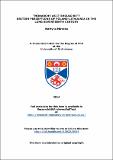Files in this item
"Monarchy as it should be"? : British perceptions of Poland-Lithuania in the long seventeenth century
Item metadata
| dc.contributor.advisor | Mason, Roger A. | |
| dc.contributor.author | Mirecka, Martyna | |
| dc.coverage.spatial | vi, 268 | en_US |
| dc.date.accessioned | 2015-01-30T13:21:40Z | |
| dc.date.available | 2015-01-30T13:21:40Z | |
| dc.date.issued | 2014-06-26 | |
| dc.identifier.uri | https://hdl.handle.net/10023/6044 | |
| dc.description.abstract | Early modern Poland-Lithuania figured significantly in the political perceptions of Europeans in the long seventeenth century – not only due to its considerable size and enormous commercial and military resources, but also, and just as importantly, due to its exceptional religious and political situation. This interest in Poland-Lithuania was shared by many Britons. However, a detailed examination of how Britons perceived Poland-Lithuania at that time and how they treated Poland-Lithuania in their political debates has never been undertaken. This thesis utilises a wide range of the previously neglected source material and considers the patterns of transmission of information to determine Britons’ awareness of Poland-Lithuania and their employment of the Polish-Lithuanian example in the British political discourse during the seventeenth century. It looks at a variety of geographical and historical information, English and Latin descriptions of Poland-Lithuania’s physical topography and boundaries, and its ethnic and cultural make-up presented in histories, atlases and maps, to establish what, where and who Poland-Lithuania was for Britons. Poland-Lithuania’s political framework, with its composite structure and unique relationship between the crown and nobility, elicited a spectrum of reactions, and so this thesis evaluates the role that both criticism and praise of Poland-Lithuania played in British constitutional debates. Consequently, the study argues that Britons’ perceptions of Poland-Lithuania were characterised by great plasticity. It claims that Britons’ impressions of the country were shaped by multiple – real or imagined - borders, whether cultural, economic or political, but also that Britons were affected by the exposure to a uniform, idealised historiography of this country. Crucially, the thesis asserts that references to Poland-Lithuania constituted an ingenious ideological and polemical device that was eagerly used throughout the period by Britons of diverse political sympathies. Moreover, through the examination of the kingdom’s geopolitical role, particularly its fluctuating position as a “bulwark of Christendom”, side by side its engagement against Protestants, the thesis challenges the assumption that anti-Catholicism dominated seventeenth-century British perceptions of the world. | en_US |
| dc.language.iso | en | en_US |
| dc.publisher | University of St Andrews | |
| dc.subject | Poland-Lithuania | en_US |
| dc.subject | Britain | en_US |
| dc.subject | Perceptions | en_US |
| dc.subject | Seventeenth century | en_US |
| dc.subject | Political ideas | en_US |
| dc.subject | Political culture | en_US |
| dc.subject | Transfer of ideas | en_US |
| dc.subject | Intellectual history | en_US |
| dc.subject.lcc | DK4291.M5 | |
| dc.subject.lcsh | Poland--Foreign public opinion, British--History--17th century | en_US |
| dc.subject.lcsh | Lithuania (Grand Duchy)--Foreign public opinion, British--History--17th century | en_US |
| dc.subject.lcsh | Great Britain--Intellectual life--17th century | en_US |
| dc.subject.lcsh | Political culture--Great Britain--History--17th century | en_US |
| dc.title | "Monarchy as it should be"? : British perceptions of Poland-Lithuania in the long seventeenth century | en_US |
| dc.type | Thesis | en_US |
| dc.type.qualificationlevel | Doctoral | en_US |
| dc.type.qualificationname | PhD Doctor of Philosophy | en_US |
| dc.publisher.institution | The University of St Andrews | en_US |
This item appears in the following Collection(s)
Items in the St Andrews Research Repository are protected by copyright, with all rights reserved, unless otherwise indicated.

